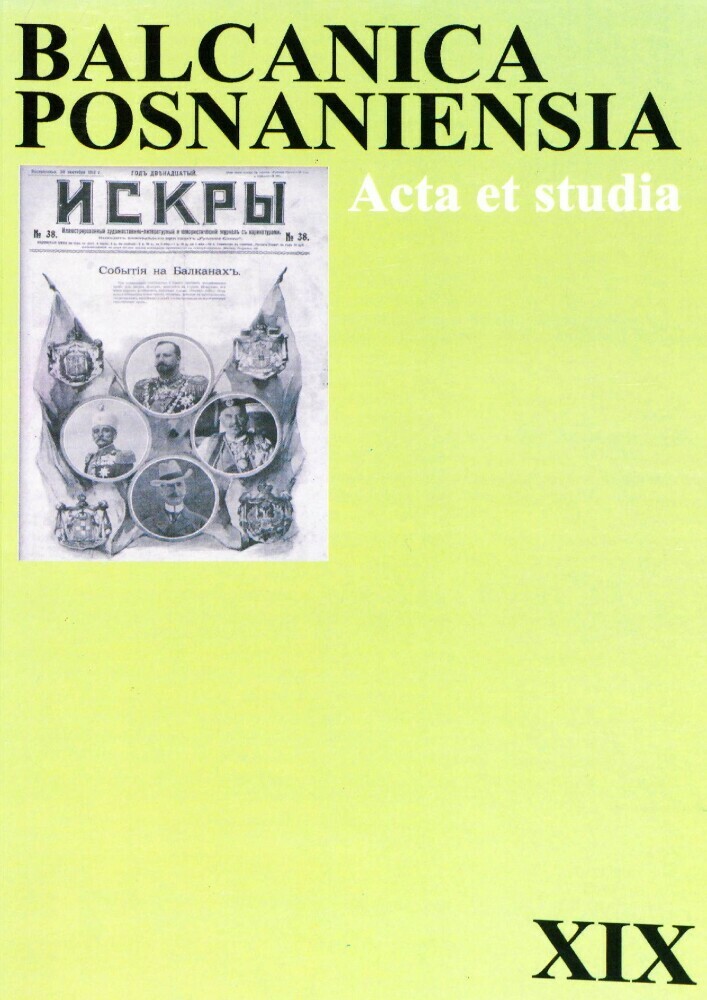Abstrakt
The aim of this paper is to examine the origin of “hot nationalism” in the Balkans. Undoubtedly, this kind of nationalism was the final element of the Balkan Wars, that erupted in 1912. The author presents the hypothesis that all Balkan conflicts have in common many factors. First of all, they were leading to develop of the modern nationalism. The ethnic cleansing, which were conducted during the Balkans Wars became the origin of the next Balkan conflicts in XX and XXI centuries. Furthermore, the most important acts of cruelty, violations, rapes, murders are being described along with the overall as it is being manifested in the case of Macedonia. The crucial source of this article constitutes The other Balkan Wars. A 1913 Carnegie Endowment inquiry in retrospect with a new introduction and reflections on the present conflict by George F. Kennan, written in Washington 1993, based on Carnegie Commission Report (1914), whose authors emphasized that “hot nationalism” manifested itself on the field of battle, drew on deeper traits of character inherited, presumably, from a distant tribal past, a tendency to view the outsider, with dark suspicion, and to see the political opponent as a fearful and implacable enemy to be rendered harmless only by total and unpitying destruction. The author asks the question if the “Eastern nationalism”, the most ferocious nationalism, still causes the threat to the security not only in the South Europe but also in the Old Continent?
Licencja
- Autor oświadcza, że przysługują mu osobiste i majątkowe prawa autorskie do Utworu oraz że nie są one ograniczone w zakresie objętym niniejszą Umową, oraz że utwór jest dziełem oryginalnym i nie narusza majątkowych lub osobistych praw autorskich innych osób.
- Autor udziela Uniwersytetowi im. Adama Mickiewicza w Poznaniu niewyłącznej i nieodpłatnej licencji na korzystanie z Utworu bez ograniczeń terytorialnych i przez czas nieokreślony na następujących polach eksploatacji:
2.1. wytwarzanie określoną techniką egzemplarzy Utworu, w tym techniką drukarską, reprograficzną, zapisu magnetycznego oraz techniką cyfrową;
2.2. wprowadzanie do obrotu, użyczenie lub najem oryginału albo egzemplarzy Utworu;
2.3. publiczne wykonanie, wystawienie, wyświetlenie, odtworzenie oraz nadawanie i reemitowanie, a także publiczne udostępnianie Utworu w taki sposób, aby każdy mógł mieć do niego dostęp w miejscu i w czasie przez siebie wybranym;
2.4. włączenie Utworu w skład utworu zbiorowego;
2.5. wprowadzanie Utworu w postacie elektronicznej na platformy elektroniczne lub inne wprowadzanie Utworu w postaci elektronicznej do Internetu, Intranetu, Extranetu lub innej sieci;
2.6. rozpowszechnianie Utworu w postaci elektronicznej w Internecie, Intranecie, Extranetu lub innej sieci, w pracy zbiorowej jak również samodzielnie;
2.7. udostępnianie Utworu w wersji elektronicznej w taki sposób, by każdy mógł mieć do niego dostęp w miejscu i w czasie przez siebie wybranym, w szczególności za pośrednictwem Internetu, Intranetu, Extranetu lin innej sieci;
2.8. udostępnianie Utworu zgodnie z wzorcem licencji Attribution-NoDerivatives 4.0 International (CC BY-ND 4.0) lub innej wersji językowej tej licencji lub którejkolwiek późniejszej wersji tej licencji, opublikowanej przez organizację Creative Commons. - Autor zezwala Uniwersytetowi im. Adama Mickiewicza w Poznaniu na:
3.1. nieodpłatne korzystanie i rozporządzanie prawami do opracowań Utworu i tymi opracowaniami.
3.2. wysyłanie metadanych Utworu oraz Utworu do komercyjnych i niekomercyjnych baz danych indeksujących czasopisma. - Autor upoważnia i zobowiązuje Uniwersytet im. Adama Mickiewicza w Poznaniu do udzielania osobom trzecim dalszych licencji (sublicencji) do Utworu oraz do innych materiałów, w tym utworów zależnych lub opracowań zawierających lub powstałych w oparciu o Utwór, przy czym postanowienia takich sublicencji będą tożsame z wzorcem licencji Attribution-NoDerivatives 4.0 International (CC BY-ND 4.0) lub innej wersji językowej tej licencji lub którejkolwiek późniejszej wersji tej licencji, opublikowanej przez organizację Creative Commons Tym samym uprawnia wszystkich zainteresowanych do korzystania z utworu wyłącznie w celach niekomercyjnych pod następującymi warunkami:
4.1. uznanie autorstwa czyli obowiązek podania wraz z rozpowszechnionym utworem informacji, o autorstwie tytule, źródle (odnośniki do oryginalnego utworu, doi) oraz samej licencji;
4.2. na tych samych warunkach, wolno rozpowszechniać utwory zależne jedynie na licencji identycznej to tej, na jakiej udostępniono utwór oryginalny. - Uniwersytet im. Adama Mickiewicza w Poznaniu jest zobowiązany do:
5.1. udostępniania Utworu w taki sposób, aby każdy mógł mieć do niego dostęp w miejscu i w czasie przez siebie wybranym bez ograniczeń technicznych;
5.2. poprawnego informowania osób, którym Utwór będzie udostępniany o udzielonych im sublicencjach w sposób umożliwiający odbiorcom zapoznanie się z nimi.

